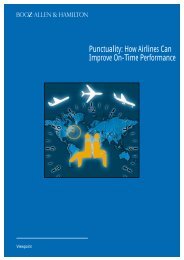The sentence
The sentence
The sentence
You also want an ePaper? Increase the reach of your titles
YUMPU automatically turns print PDFs into web optimized ePapers that Google loves.
2. An ‘uncertain’ question may produce a ‘certain’ answer:<br />
Can he still be working? – Yes, he is.<br />
3. We use be and have been to answer questions with be:<br />
Is he ill? – He may be. Was he ill? – He may have been. (Not *he may*)<br />
4. We use do/done to replace other verbs, though this is optional:<br />
Will you catch the early train? – I may./I may do.<br />
Has he received my message? – He could have./He could have done.<br />
5. We also answer Wh-questions with ‘certainty’ or ‘uncertainty’:<br />
What’s his name? – It’s Smith. (certain) It may/might be Smith. (uncertain)<br />
What was his name? – It was Smith. (certain) It may/might have been Smith.<br />
(uncertain)<br />
E. Uses of modals of express deduction<br />
Certainly or deduction?<br />
1. We express certainty with be or any full verb: He is here. He lives here. He is leaving.<br />
2. We express deduction with must be/can’t be, must have been, can’t/couldn’t have been:<br />
He must be at home. He can’t be out. He must have been at home yesterday.<br />
Or with verbs other than be: He must live abroad. He must have lived abroad.<br />
Two kinds of ‘must be’<br />
1. We use must be in the present to express deduction:<br />
You haven’t eaten for hours. You must be hungry!<br />
2. <strong>The</strong> negative of must be (= deduction) is can’t be, not *mustn’t be*:<br />
You’ve only just eaten. You can’t be hungry again! (Not *mustn’t be*)<br />
3. We can also use must (be) to express total obligation:<br />
This is a hospital. You must be quiet.<br />
4. <strong>The</strong> negative of must (be) (= total obligation) is mustn’t (be) (= prohibition):<br />
You mustn’t be noisy outside a hospital.<br />
‘Must have/been’, can’t/couldn’t have been’; ‘had to be/didn’t have to be’<br />
1. We express deduction about the past with must have been:<br />
You hadn’t eaten for hours. You must have been hungry!<br />
2. <strong>The</strong> negative of must have been is can’t/couldn’t have been, not *mustn’t have been*:<br />
You had already eaten. You can’t/couldn’t have been hungry! (Not *mustn’t have been*)<br />
3. Must (= total obligation) is not a ‘complete verb’. We use had to in the past:<br />
<strong>The</strong> meeting was at 10 this morning and I had to be there. (Not *must have been*)<br />
4. <strong>The</strong> negative of had to is didn’t have to:<br />
It was a holiday yesterday, so I didn’t have to be at work. (Not *mustn’t have been*)<br />
71




